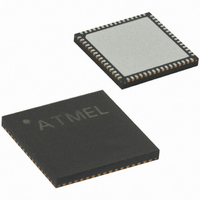ATMEGA645-16MU Atmel, ATMEGA645-16MU Datasheet - Page 220

ATMEGA645-16MU
Manufacturer Part Number
ATMEGA645-16MU
Description
IC AVR MCU FLASH 64K 64-QFN
Manufacturer
Atmel
Series
AVR® ATmegar
Datasheet
1.ATMEGA325-16MU.pdf
(362 pages)
Specifications of ATMEGA645-16MU
Core Processor
AVR
Core Size
8-Bit
Speed
16MHz
Connectivity
SPI, UART/USART, USI
Peripherals
Brown-out Detect/Reset, POR, PWM, WDT
Number Of I /o
53
Program Memory Size
64KB (32K x 16)
Program Memory Type
FLASH
Eeprom Size
2K x 8
Ram Size
4K x 8
Voltage - Supply (vcc/vdd)
2.7 V ~ 5.5 V
Data Converters
A/D 8x10b
Oscillator Type
Internal
Operating Temperature
-40°C ~ 85°C
Package / Case
64-MLF®, 64-QFN
Processor Series
ATMEGA64x
Core
AVR8
Data Bus Width
8 bit
Data Ram Size
4 KB
Interface Type
SPI, UART, USI
Maximum Clock Frequency
16 MHz
Number Of Programmable I/os
54
Number Of Timers
3
Operating Supply Voltage
2.7 V to 5.5 V
Maximum Operating Temperature
+ 85 C
Mounting Style
SMD/SMT
3rd Party Development Tools
EWAVR, EWAVR-BL
Development Tools By Supplier
ATAVRDRAGON, ATSTK500, ATSTK600, ATAVRISP2, ATAVRONEKIT
Minimum Operating Temperature
- 40 C
On-chip Adc
10 bit, 8 Channel
Package
64MLF EP
Device Core
AVR
Family Name
ATmega
Maximum Speed
16 MHz
For Use With
ATSTK600-TQFP64 - STK600 SOCKET/ADAPTER 64-TQFP770-1007 - ISP 4PORT ATMEL AVR MCU SPI/JTAGATAVRISP2 - PROGRAMMER AVR IN SYSTEM
Lead Free Status / RoHS Status
Lead free / RoHS Compliant
Available stocks
Company
Part Number
Manufacturer
Quantity
Price
Company:
Part Number:
ATMEGA645-16MU
Manufacturer:
ATECH
Quantity:
729
Part Number:
ATMEGA645-16MU
Manufacturer:
ATMEL/爱特梅尔
Quantity:
20 000
- Current page: 220 of 362
- Download datasheet (7Mb)
23.4
2570M–AVR–04/11
TAP Controller
Figure 23-2. TAP Controller State Diagram
The TAP controller is a 16-state finite state machine that controls the operation of the Boundary-
scan circuitry, JTAG programming circuitry, or On-chip Debug system. The state transitions
depicted in
transition) at the time of the rising edge at TCK. The initial state after a Power-on Reset is Test-
Logic-Reset.
As a definition in this document, the LSB is shifted in and out first for all Shift Registers.
Assuming Run-Test/Idle is the present state, a typical scenario for using the JTAG interface is:
•
At the TMS input, apply the sequence 1, 1, 0, 0 at the rising edges of TCK to enter the Shift
Instruction Register – Shift-IR state. While in this state, shift the four bits of the JTAG
instructions into the JTAG Instruction Register from the TDI input at the rising edge of TCK.
The TMS input must be held low during input of the 3 LSBs in order to remain in the Shift-IR
state. The MSB of the instruction is shifted in when this state is left by setting TMS high.
While the instruction is shifted in from the TDI pin, the captured IR-state 0x01 is shifted out
on the TDO pin. The JTAG Instruction selects a particular Data Register as path between
TDI and TDO and controls the circuitry surrounding the selected Data Register.
1
0
Figure 23-2
Test-Logic-Reset
Run-Test/Idle
0
depend on the signal present on TMS (shown adjacent to each state
1
1
0
Select-DR Scan
Capture-DR
Update-DR
Pause-DR
Exit1-DR
Exit2-DR
Shift-DR
ATmega325/3250/645/6450
1
0
0
1
0
1
1
0
1
1
0
0
1
0
Select-IR Scan
Capture-IR
Update-IR
Pause-IR
Exit1-IR
Exit2-IR
Shift-IR
1
0
0
1
0
1
1
0
1
1
0
0
220
Related parts for ATMEGA645-16MU
Image
Part Number
Description
Manufacturer
Datasheet
Request
R

Part Number:
Description:
Manufacturer:
Atmel Corporation
Datasheet:

Part Number:
Description:
IC AVR MCU FLASH 64K 64TQFP
Manufacturer:
Atmel
Datasheet:

Part Number:
Description:
IC AVR MCU FLASH 64K 5V 64TQFP
Manufacturer:
Atmel
Datasheet:

Part Number:
Description:
MCU AVR 64KB FLASH 16MHZ 64TQFP
Manufacturer:
Atmel
Datasheet:

Part Number:
Description:
MCU AVR 64KB FLASH 16MHZ 64QFN
Manufacturer:
Atmel
Datasheet:

Part Number:
Description:
IC AVR MCU FLASH 64K 5V 64QFN
Manufacturer:
Atmel
Datasheet:

Part Number:
Description:
Manufacturer:
Atmel Corporation
Datasheet:

Part Number:
Description:
Manufacturer:
ATMEL Corporation
Datasheet:

Part Number:
Description:
Manufacturer:
ATMEL Corporation
Datasheet:

Part Number:
Description:
IC AVR MCU 64K 16MHZ 5V 64TQFP
Manufacturer:
Atmel
Datasheet:

Part Number:
Description:
IC AVR MCU 64K 16MHZ 5V 64-QFN
Manufacturer:
Atmel
Datasheet:

Part Number:
Description:
IC AVR MCU 64K 16MHZ COM 64-TQFP
Manufacturer:
Atmel
Datasheet:

Part Number:
Description:
IC AVR MCU 64K 16MHZ IND 64-TQFP
Manufacturer:
Atmel
Datasheet:

Part Number:
Description:
IC AVR MCU 64K 16MHZ COM 64-QFN
Manufacturer:
Atmel
Datasheet:











